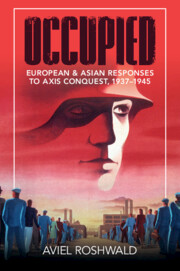Book contents
- Occupied
- Occupied
- Copyright page
- Dedication
- Contents
- Figures
- Maps
- Acknowledgments
- Introduction
- Part I Patriotisms under Occupation (the Netherlands, France, Denmark, and Thailand)
- Part II Fractured Societies and Fractal Identities: Civil Wars under Occupation (Greece, Yugoslavia, Italy, and China)
- Part III Conquest in the Guise of Liberation (the Philippines, Indonesia, and Ukraine)
- Prologue to Part III
- 7 Colonial Histories
- 8 The Ghosts of Colonialisms Past and the Weight of Occupations Present
- Conclusion to Part III
- Conclusion
- Bibliography
- Index
Prologue to Part III
from Part III - Conquest in the Guise of Liberation (the Philippines, Indonesia, and Ukraine)
Published online by Cambridge University Press: 20 April 2023
- Occupied
- Occupied
- Copyright page
- Dedication
- Contents
- Figures
- Maps
- Acknowledgments
- Introduction
- Part I Patriotisms under Occupation (the Netherlands, France, Denmark, and Thailand)
- Part II Fractured Societies and Fractal Identities: Civil Wars under Occupation (Greece, Yugoslavia, Italy, and China)
- Part III Conquest in the Guise of Liberation (the Philippines, Indonesia, and Ukraine)
- Prologue to Part III
- 7 Colonial Histories
- 8 The Ghosts of Colonialisms Past and the Weight of Occupations Present
- Conclusion to Part III
- Conclusion
- Bibliography
- Index
Summary
Up to this point, the major units of analysis in this book have, predominantly, been countries that were internationally recognized as independent prior to their invasion by Axis powers in the early stages of the Second World War. Yet, when one casts one’s eyes upon Japan’s wartime conquests, one quickly realizes that, apart from China and Thailand, all the lands that fell under the sway of the Rising Sun during the Second World War had previously been held by overseas colonial powers – notably, the French in Indochina, the British in Burma and Malaya, the Dutch in what was later to be called Indonesia,1 and the Americans in the Philippines. In other words, these countries were occupied in the first place, which allowed Japanese propagandists to present their seizure as blows struck against Western imperialism rather than as assaults on the peoples of these lands. Regardless of the sincerity or lack of it in Japanese claims to be acting as liberators rather than conquerors of their fellow Asians, the context of prior colonization seems, at first sight, to preclude useful comparison with any cases in Europe, where the Habsburg and Romanov empires had collapsed some two decades prior to the onset of the Second World War.
- Type
- Chapter
- Information
- OccupiedEuropean and Asian Responses to Axis Conquest, 1937–1945, pp. 253 - 256Publisher: Cambridge University PressPrint publication year: 2023

